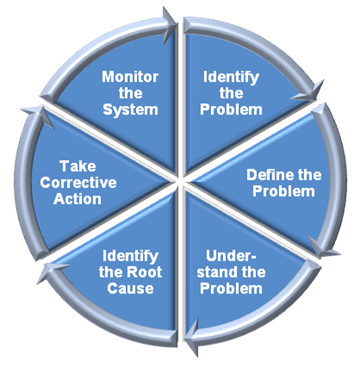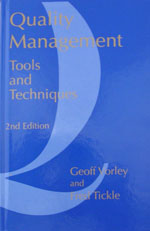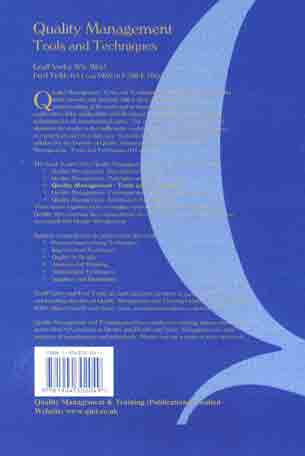|
Quality Management & Training Limited
Root Cause Analysis (RCA):
Root cause analysis is a methodology that is continually evolving.
Like most Quality Improvement approaches it is not magic; "there is no silver
bullet". It is the application in a different way of a series of well known,
common sense techniques which used in a different combination can produce a
systematic, quantified and documented approach to the identification,
understanding and resolution of underlying causes of under achieved quality in
organisations. Below is a definition, which encapsulates the main points of this
technique:
"An objective, thorough and disciplined methodology
employed to determine the most probable underlying causes of problems and
undesired events within an organisation with the aim of formulating and agreeing
corrective actions to at least mitigate if not eliminate those causes and so
produce significant long term performance improvement."
|
 |
Definitions:
There are a number of difference definitions of RCA
- "An objective, thorough and disciplined methodology
employed to determine the most probable underlying causes of problems
and undesired events within an organisation with the aim of formulating and
agreeing corrective actions to at least mitigate if not eliminate those causes
and so produce significant long term performance improvement."
- Vorley & Tickle, Quality Management (Tools & Techniques), 2002
- "A powerful tool used to identify, record and visually
represent the possible causes of a problem" Instead of problems and their
effects appearing vast and insoluble, root cause analysis breaks down the
problem into smaller, more easily handled chunks represented by a 'fishbone'
diagram". - Paul Wilson RCA (ASQC)
- "The investigation and reporting the causes of
occurrences to enable the identification of corrective actions adequate to
prevent recurrence and thereby protect the health and safety of the public,
the workers, and the environment." - RCA Guidance
document DOE Guidelines, Feb 92
|
Why
is RCA important?
Well there are a number of reason:
- Getting to the root cause means stopping it from ever
happening again
- A structured problem solving - an agreed approach
Determines underlying causes
- It prevents reoccurrence
- Provides a permanent solutions
- It avoids repeats of non-conformities
Also it may be:
- Part of policy and goals of the Organisation
- Providing long term improvement
- A powerful vehicle for training people
- Analysing for root cause is a mind-set, it takes more time
at first but is a 'high return investment' for eliminating fire fighting
|
 |
|
There is available a RCA Mini
Guide in pdf format which also is downloadable by clicking of the image
opposite. Note:
none printable for actual booklet email
sales@qmt.co.uk)
Contents list
1)
Introduction.
2)
Why complete Root Cause
Analysis?.
3)
QM&T approach to RCA.
4)
Practical guide to
carrying out an RCA.
5)
RCA Tools & Techniques.
6)
Look up table for
completing an RCA.
7)
Examples RCA's.
8)
Hints and Tips.
9)
12 Pitfalls of RCA.
Techniques
Associated with RCA
5 whys - Gemba Gembutsu
Gemba is
Japanese for the place where the problem has happened. Gembutsu is Japanese
for the actual information.
Consequently, gemba gembutsu is actual information obtained at the scene of
the problem. Therefore gemba gembutsu kaizen would be improvement
established as a consequence of information from the problem scene.
5 Why's
- A
process of asking Why? at least five times
- Method
of establishing whether cause is symptom, lower level cause or Root Cause
-
Questioning technique to provide further information
Much more
practical details regarding Gemba Gembutsu and 5 Why's is provided in
Vorley & Tickles book
Quality Management (Tools & Techniques).
Free copy of the book Quality Management by Geoff Vorley & Fred Tickle
provided for each course delegate.
|
 |
| |
|
|
|
Alternatively a more fuller
explanation is available in the book
Quality Management Tools & Techniques
By: Geoff Vorley and Fred Tickle
Book Introduction
This book Quality
Management (Tools and Techniques) is intended to provide quality
professionals and students with a clear and comprehensive understanding of
the tools and techniques of quality. It delivers an exploration of the
applicability and effectiveness of different quality tools and techniques
for all organisational types. The intention being to encourage and stimulate
the reader to feel sufficiently confident to use the tools and techniques in
a practical and rewarding way.
Quality Management (Tools and Techniques) is
part of the Quality Management series which includes; Introduction to
Quality, Quality Management (Principles and Practice) and Quality Management
(Communications and Projects). For clarity and continuity purposes, there is
correctly some overlap between these titles. However, this book is expected
to be 'stand alone' and a comprehensive and practical reference to all the
major quality management tools and techniques.
The overall aim of this book Quality Management
(Tools and Techniques) is to:
-
provide a clear awareness and understanding
of the disciplines, tools and techniques of quality improvement.
-
enable the user to be capable of practical
evaluation of the tools and techniques for variety of situations.
-
enable the confident application of the
appropriate quality tools and techniques for the selected activities in
the business or organisation.
Detailed below, is what could reasonably be
expected to be appreciated and be competent in performing, as a consequence
of studying this book.
-
Demonstrate and present an argument for the
use of the tools and techniques of quality improvement.
-
Evaluate the applicability of tools and
techniques of quality.
-
Appropriately apply the quality tool or
technique.
-
Appraise the effectiveness of individual
applications of the quality tool or technique.
-
Analyse the contribution to quality
improvement of the tools and techniques in a variety of organisational
settings.
-
Understand and develop the relationship
between an organisation and its suppliers.
INFORMATION
- ISBN 1 904302 19 X
- Pages: 359
- Diagrams &
Pictures: 126
- Tables: 47
|

 |
For further information
Training courses
If you would like to know more about RCA please contact
Sales at:
Telephone:
+44 -0 1483 453511
Fax: +44 -0 1483 453512
Postal address:
Quality Management & Training Limited PO Box
172, Guildford, Surrey, GU2 7FN United Kingdom
Electronic mail:
Technical Support:
help@qmt.co.uk
General Information:
sales@qmt.co.uk
Customer Support:
tutor@qmt.co.uk
|